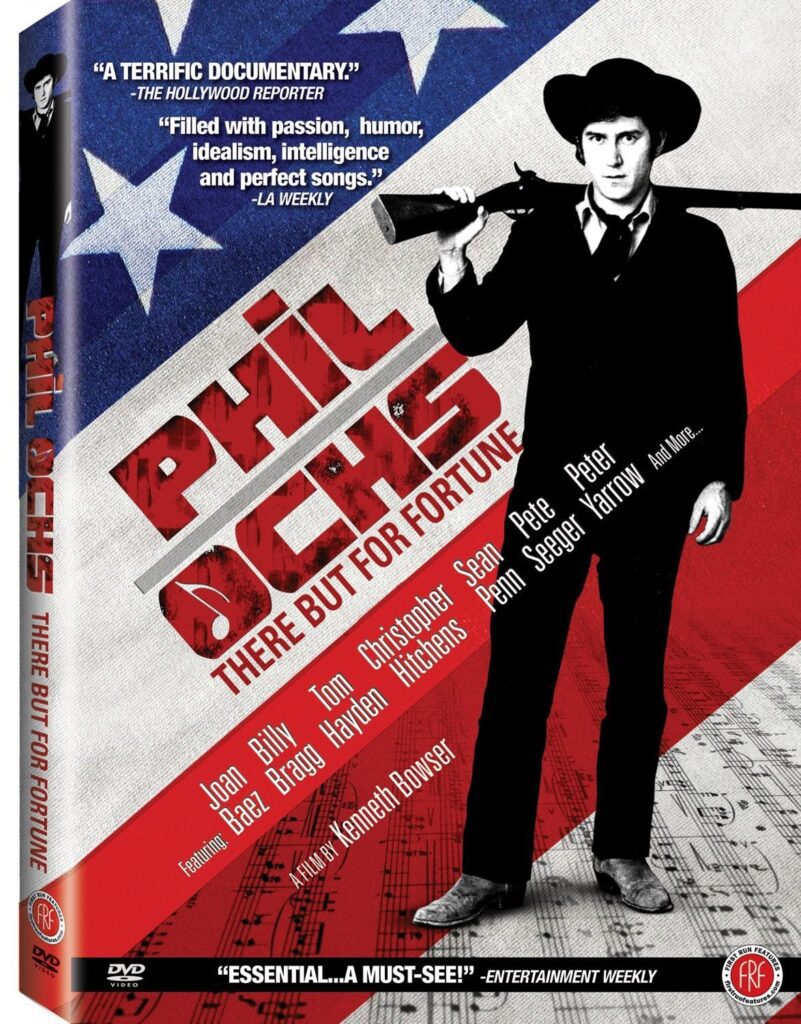
As Kenneth Bowser’s new documentary Phil Ochs: There but for Fortune makes clear, folksinger Phil Ochs (1940 – 1976) was a study in contradictions. As part of the Greenwich Village coffee-house scene of the early sixties, Ochs espoused the de riguer leftist politics of the day. On the other hand, he was a proud product of Virginia’s Staunton Military Academy, and a big fan of WWII-veteran-turned-actor Audie Murphy, not to mention John Wayne. As friend Andy Wickham puts it: “Left-wing politics was his career, but it was not what was in his heart.”
His conflicting emotions were most dramatically exemplified in his attitude towards fame. While publicly nonchalant about his success (or lack thereof), he harbored a deep desire to be a star. Ochs’ refusal to cater to the whims of the public virtually guaranteed his lifelong status as a cult artist though. This, coupled which his undiagnosed bipolar disorder and alcoholism, doomed the man to a lifetime of depression. All of these factors led to his to his eventual suicide in 1976.
Bowser has lined up an impressive array of people to tell the complex tale of Phil Ochs’ life. These include Joan Baez, Pete Seeger, Tom Hayden, brother Michael Ochs, and daughter Meegan Ochs among many others. All contribute a great deal of insight into his life, but the glaring absence of Bob Dylan is keenly felt. In many ways, Dylan’s massive popularity cruelly mocked Ochs.
As young folkies, the two were always friendly rivals. But Dylan’s dominance was clear early on. Once while traveling, Dylan played “Can You Please Crawl Out Your Window” for Phil, then solicited his opinion. When Ochs told him that he did not think the tune was one of his better efforts, Dylan kicked him out of the car.
Phil Ochs’ dark sense of humor was one of the things his fans loved the most. This manifested itself in many ways, most hilariously on his 1970 LP Greatest Hits. The album contained all-new material, and the cover found Ochs clad in a gold lame’ suite, ala Elvis. The Presley parody was completed with a send up of the album 50,000,000 Elvis Fans Can’t Be Wrong – and its subtitle: “50 Phil Ochs Fans Can’t Be Wrong.” Taking the joke further, he wore the suit on the hallowed stage of Carnegie Hall. The audience was livid, shouting things like “Bring back Phil Ochs” at him while he played. While the entire affair was undeniably funny, the truth is that Phil Ochs was steadily deteriorating.
His troubles had begun publicly manifesting themselves much earlier. He had been profoundly affected by the assassinations of Robert Kennedy and Martin Luther King Jr., and the Democatric Convention in Chicago debacle in 1968. In reference to these events, the 1969 LP Rehearsals For Retirement featured a mock headstone reading “Phil Ochs – American – Born: El Paso, Texas 1940 – Died: Chicago, Illinois, 1968.”
In August 1971 he went to Chile, where Marxist candidate Salvador Allende had been democratically elected President. When Allende was later murdered, Phil was convinced that the CIA was behind it. The paranoia only increased over the next few years. On a trip to Tanzania in 1973, he was attacked and robbed. The strangulation he suffered resulted in serious damage to his vocal chords, which affected his voice for the rest of his life. He always believed that the CIA or FBI were responsible for the attack. Sadly, Phil Ochs continued to unravel. Just prior to his suicide, he had been diagnosed with bipolar disorder. It is unclear if he ever took the medications prescribed for the condition however.
One of the most impressive attributes of the film is the early footage of Phil performing. Not only is the material in pristine condition, but he is such a vibrant and charismatic personage onstage as to seem destined for stardom. As for DVD extras, there are very few. A photo gallery and director’s biography are about it. Not to worry however, as There but for Fortune is strong enough on its own to hold our interest. The film is a long overdue acknowledgement of a major musical talent, even if his popularity never reflected his songwriting genius. This is one of the better music documentaries I have seen in some time, and well worth a look.